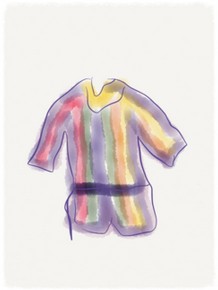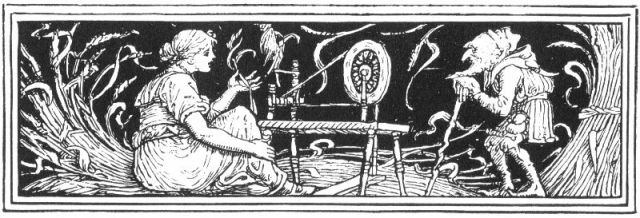by Josh Yarden, with Dotan Yarden

The Arc of Change
In a previous essay posted here last month, I began to sketch the arc of Joseph's life. With Joseph, the narrative takes a new turn. All of the major figures in the Book of Genesis before him are in some way chosen—created, inspired or called to serve. Their stories begin with some sort of exemplary behavior or praise-worthy qualities. Each protagonist rises and falls, followed by the next rising star. As each star sets, the heroes' later days somehow disgrace their valiant youth. If we ignore this recurring theme that spirals through the narrative at the end of each episode, we miss an important opportunity to learn from the text.
Joseph is the first hero to reverse the ‘rise and fall' pattern. He starts out as an arrogant liar, braying at his brothers like a jackass, treating them like animals, the way a shepherd growls at sheep to keep them in line with the flock. Provoking his brothers, and eventually his father too, led them to put Joseph in his place. He will eventually become a great hero, but not before being put in his place and nearly losing his life along the way.
The Herd Mentality
Joseph first imagines he can lord over his brothers. This foreshadowing doesn't seem to bother his father, Jacob, who rewards Joseph with the striped tunic, the ‘coat of many colors.' Taunting his older brothers, however, does not satisfy his desire for power and influence. Joseph goes on to dream that his own parents will also bow down to him.
When Joseph has the audacity to tell his father about that dream, Jacob finally loses his temper. The text reads: “He kept the matter,” which is a gentle euphemism for bearing a grudge. The context of the story makes that plain, if not crystal clear, when Jacob sends his sons away with the flock and later sends Joseph off to bring him a report. It may seem innocent enough at first glance, and Joseph does not seem to suspect anything right away, but Jacob is sending Joseph into the hands of his angry brothers who now know that Jacob is also incensed.
The enmity between Joseph and his brothers spirals out of control when they see him approaching. The idea of killing him is first mentioned in the text, but the suggestion is not attributed to anyone by name. A murder is about to be committed, and it is not even clear where the idea came from. This is how the dynamic of the herd mentality can transform honest folks into an angry mob: Individuals stop thinking when they lose their patience. Intoxicated by a cocktail of indignation and strength in numbers, the adulterated human spirit is stirred into a rage. With the loss of individuality goes the capacity for independent judgement. One who is caught up in the fervor of the crowd is lost without access to a moral compass.
Swept up in the frenzy of a crowd, it is impossible to follow an otherwise obvious moral imperative. The critical turn away from violence requires reemerging from the sea of anger as an individual. This essential character of critical thinking is embedded in the conceptual level of the text. Take a look at the following translation of Genesis, chapter 37 verse 16-27. When the narrative refers to the brothers acting as one group, Joseph's life is in danger. When an individual acts alone, sanity is restored, at least to some extent.
And they see him from afar
and before he draws near to them
they consort against him to kill him.
So they said
one to his brother
hey, the dreamer approaches.
Now go and we will kill him
and we will throw him in one of the cisterns and we will say a wild beast ate him
then we'll see what his dreams will be.
Acting as a gang, the brothers want to spill Joseph's blood. The text does not say anything about the thoughts or the motivations of the individuals until Reuben steps up in verse 21. Thinking on his own, he saves Joseph's life.
When Reuben hears,
he saves him from their hand.
We will not strike him mortally.
And Reuben says to them, “Do not spill blood.
Throw him into this cistern in the desert, but do not lay a hand on him,”
so that he could save him from their hand, to return him to their father.
And so it was, when Joseph comes to his brothers
they strip Joseph of his tunic
the striped tunic that's on him.
When Reuben leaves, in verse 24, the gang goes back into action:
And they take him
and throw him into the empty cistern
without any water in it.
Then, they sit to eat bread
and they raise their eyes and they see, here comes a caravan of Ishmaelites from Gil'ad
with their camels bearing spices and myrrh and balm going to bring it down to Egypt.
Yehuda emerges as an independent actor in verse 26. He also tries to save Joseph:
What would be accomplished by us killing our brother and covering up his blood?
Let's go and sell him to the Ishmaelites and we don't lay a hand on him
because he is our brother, our flesh. And his brothers listen to him.
When the brothers act as a group they are all cruel to Joseph. Each time an individual takes the initiative to think for himself, he works against the dynamic of the herd mentality. Standing up to group requires real courage. When Ruben returns to the pit and discovers that Joseph is no longer there, he rips in own garment, in a sign of mourning. Assuming Joseph has been killed, he is struck with notion that he may be next. Approaching his brothers, he says, “Joseph is gone. What, pray tell, will become of me?”
The brothers have a more pressing question on their mind. What will they tell their father about his favorite son? It turns out that they reserve the worse punishment for him. Deceiving their own father into believing that Joseph has been killed by a wild animal may be the cruelest act of the story. Jacob, who set the events in motion, blames himself. Remember the opening words of this chapter of Genesis: “These are Jacob's issues.” These sons were issued from his seed, and these are the issues he must deal with for the rest of his life.
Jacob tears his clothes and puts on sackcloth. His children disingenuously attempt to console their father, but he will not be comforted. Instead he cries,
I will go down
mourning for my son
to Sheol
The Book of Genesis is a family affair (and, frankly, it seems to be the kind of family that gives holiday gatherings a bad name.) Abraham's family tree has more than a few broken branches. They do set the stage for the story of a nation, but they are a rather unpleasant bunch, to say the least.
Tradition praises the virtues of biblical characters. Some commentators seem to go to inordinate lengths to justify their behavior, or at least to see it within the context of a larger plan. But the characters themselves do not attribute their actions to a higher purpose. We can make excuses for them, but if we judge the archetypal characters in the Genesis narrative on the merit of their own behavior, we have to conclude that they are not particularly honest, often impatient, and at times—when they seem to need each other the most—they are irrevocably cruel to one another.
Joseph is Different
Joseph might have died in that empty cistern in the desert, but surviving that dramatic moment is a small part of his story. He will be imprisoned and threatened with death again. His true greatness is this: He starts out as an insufferable problem child, thanks in large part to his father's conspicuous favoritism. He manages to get ahold of his dreams, and he becomes truly powerful when he learns to becomes the world's greatest problem solver.
After adopting an entirely new life for himself, Joseph is caught off guard when, due to the famine in Canaan, the brothers seek assistance in Egypt. Joseph is revisited by his past. He recognizes his Hebrew brothers, but they do not see that they are speaking with Joseph, because they never would have imagined that he would grow up to become a most powerful Egyptian. Now he is faced with a golden opportunity to take revenge on his brothers. All he has to do is ignore them.
Imagine for a moment that Joseph's story was written with three possible endings, the one we have as well as a version in which Joseph is killed by his brothers, and another in which he ignores them when they seek his assistance in Egypt. If you didn't know the story as it is told, which ending do you think you would choose? I wonder which ending would be the most popular in a society where people seem to prefer winners and losers, so often rationalize away their own mistakes, and commonly justify nefarious actions by ignoring the consequences and focusing instead on some imagined higher purpose.
Given the recurring cycle of falling heroes in the Book of Genesis, with previously honorable people adopting immoral ways later in life, it makes sense to assume that Joseph would punish his brothers in some manner. If so, he would simply join the parade of fallen heroes. In a surprising shift of the narrative arc, however, Joseph's story is a critical turn for the biblical hero. He chooses to resolve rather than to perpetuate the cascading conflicts among generations of brothers in his family. All of the brothers will get through this crisis together, and from this generation on, the descendants of all of Jacob's sons will be the People of Israel.
The story of Jacob's issues contains multiple negative lessons about hubris, favoritism, anger and the herd mentality. It also culminates in a wonderfully complex and powerfully positive message: Recurring cycles can be disrupted. It is possible to have a new beginning in life, even under the most difficult conditions.
When it comes to personal integrity, we are not condemned to accept that 'what goes up must come down.' Our ethical judgement does not have to fail us or those who depend upon us. On the grand national scale, it is Joseph's ingenuity that enables Egypt to survive a drought without falling into famine. And Joseph is also the great innovator on the personal level, saving his family from destroying itself.
Epilogue: Why read the Bible?
The 'heroes' of the Bible stories are complex literary protagonists, rather than idols to be worshipped. Regardless of the historical accuracy of these stories, they ring true through the experiences of characters with real faults, sometimes causing and often grappling with the very real types of problems people actually face in life. In that sense, the stories of the biblical archetypes are perhaps even more truthful than some of the well-spun stories that appear to be verifiably accurate journalistic accounts.
The biblical stories that have been passed down for millennia are indeed literary treasures. They are particularly valuable in the way they leave so much open space for filling in details between the lines, within the framework of the story. The stories themselves make no claim of historical accuracy. They are canvases upon which successive generations can join in the conversation and draw their own conclusions.
Through interpretation and reinterpretation of the moral ambiguity embedded in ancient literature, we learn to examine the moral ambiguity present in our own lives. Then, when the time comes for us to act in our own historical context, we might be better positioned to reflect on the potential repercussions of our decisions. If we can avoid going down a regrettable path before the damage is done, we may be able to avoid spending our later days at war, in mourning, cursing ourselves or making contemptible excuses for reprehensible behavior.
* This essay is a continuation of “Joseph: Fallen Hero Rising,” posted here last month.


 “This is the story of a man. Not rich and powerful, not a big man like your father, Sweetheart. Just a funny little man. I didn’t know him long, only three nights. But there was something about him, something magical.” If “Rumpelstiltskin” started with this framing, we would have a different picture of the story’s meaning, a truer picture, for this framing suggests what is hidden below the surface.
“This is the story of a man. Not rich and powerful, not a big man like your father, Sweetheart. Just a funny little man. I didn’t know him long, only three nights. But there was something about him, something magical.” If “Rumpelstiltskin” started with this framing, we would have a different picture of the story’s meaning, a truer picture, for this framing suggests what is hidden below the surface.